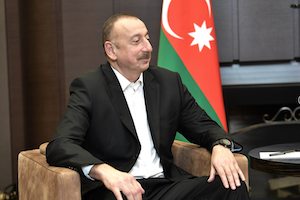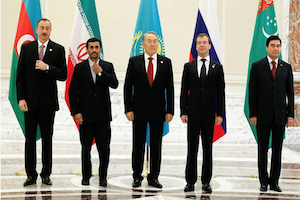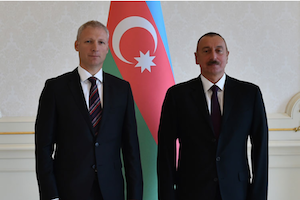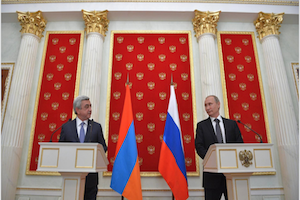Azerbaijan's New Cabinet Composition Indicates Pro-reform Agenda
By Fariz Ismailzade
May 11, 2018, the CACI Analyst
The appointment of a new Prime Minister and the new composition of the Cabinet of Ministers of Azerbaijan have raised hopes for speedy economic reforms and liberalization of the national economy. New, young and foreign-educated ministers are expected to create more transparency and accountability in the system, create a more attractive business climate and further ensure the sustainable development of the country. President Aliyev’s new appointments have been welcomed by the public and foreign investors, and hint at the urgent need to deepen the pace of reforms.

Is there an Agreement on Caspian Sea Delimitation?
By Stephen Blank
January 25, 2018, the CACI Analyst
On December 5, 2017, Russian Foreign Minister Sergei Lavrov announced that all the key issues regarding the delimitation of the Caspian Sea had been resolved and that a treaty was being prepared for heads of state to sign in 2018 in Astana. Yet less optimistic statements from the other parties, particularly Iran, suggest that Lavrov’s assessment was premature. If Russia and Iran can nevertheless reconcile their differences on the demarcation of the Caspian, this would have important strategic consequences not only for the littoral states, but also for the Caucasus, Central Asia and the Middle East.

Azerbaijan Seeks to Speed Up Conclusion of New Agreement with the EU
By Ilgar Gurbanov
January 23, 2018, the CACI Analyst
Before the Eastern Partnership’s (EaP) Brussels Summit in November 2017, many observers expected the finalization of the new EU-Azerbaijan agreement. However, neither this agreement nor an expected aviation agreement were signed, as many technical challenges remain to be addressed. Azerbaijan signed only a visa-free agreement with the BeNeLux countries for service passports holders and the indicative maps of the Trans-European transport network (TEN-T). The summit’s final declaration clearly articulated the EU’s support for the territorial integrity and sovereignty of its partners and called for peaceful conflict settlement based on international law. The declaration also hailed the Southern Gas Corridor’s (SGC) strategic importance and the progress made in the negotiations for the new agreement.

Russian Loan Allows Armenia to Upgrade Military Capabilities
By Eduard Abrahamyan
January 8, 2018, the CACI Analyst
On December 6, 2017, the Armenian Parliament unanimously ratified the Armenian-Russian US$ 100 million “state export loan.” The accord, signed on October 24, allows Yerevan to borrow funds for purchasing a wide range of sophisticated arms manufactured by Russia in order to implement the “Common Defense Sector Development Plan.” This is Moscow’s second programmed military loan to Armenia, following the US$ 200 million loan agreed in 2015 which is now in the final stage of realization. The pending loan is intended to allow Yerevan to uphold its consistent procurement of military hardware since 2011 in an effort to negate Azerbaijan’s military-technical superiority.

Kazakhstan, Georgia and Azerbaijan Support Spain's Integrity
By Stephen Blank
December 13, 2017, the CACI Analyst
Recently, Kazakhstan, Georgia and Azerbaijan proclaimed their support for and recognition of Spain’s territorial integrity. These announcements were obviously triggered by the outbreak of the crisis around Catalonia’s independence referendum. While Spain’s political destiny is hardly a vital interest for these governments, they do worry about the continuing episodes of minority unrest that could furnish precedents for the dissolution of other multi-ethnic or multi-confessional states like them. On this point, these three governments, probably along with all the others in what used to be the Soviet Union, have justified reasons for concern.



